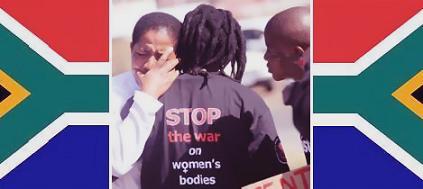
On April 22nd, South Africa will hold its latest round of elections and for the first time in the last 15 years, the African National Congress (ANC) has serious competition. The upstart Congress of the People, headed by former ANC leader Thabo Mbeki, was created in December to address concerns over corruption in and the direction of the ANC.
Though the ANC is expected to win by large margins, it is clear that South Africa is changing and the extreme violence and poverty are taking their toll on the stance of the historic party. But what is the actual difference between the parties? And what would all of this mean for women, sex workers in particular? With the looming 2010 FIFA World Cup, South Africa continues to be plagued by infrastructural issues as well as climbing rates of violent crime, particularly crime related to violence against women and children.
Over the past year, specifically, there has been a large pattern of “corrective rapes” committed against lesbians; the majority of these acts are committed by gangs of men rather than a single person. The most notorious of these rapes was committed against one of the most famous female soccer players in South Africa, Eudy Simelane, last April. She was gang raped and left in a ditch after being stabbed 25 times in the face, chest and legs. While some focus on homophobia as an explanation for these acts, the brutality and pervasiveness of these acts implies larger underlying issues related to violence and gender. Women of all backgrounds and orientations are being affected by rising violence, which is more and more being attributed to an “increasingly macho culture, which seeks to oppress women and sees them as merely sexual beings.” Lesbians are being targeted in particular because their orientation is seen as antithetical to these gender roles in which women are expected to be more and more diminutive to men. Attacks such as these are then not specific to sexual orientation but signify a larger social policing of women.
Likewise, trafficking has become a growing specter within South Africa. Unlike in the U.S., the state is primarily confronted with trafficking occurring between different regions of the country itself. It involves primarily women and children from rural provinces like KwaZulu-Natal and the Transkei into urban areas primarily around Cape Town and Johannesburg. Trafficking of different populations has risen in recent years for a variety of reasons. In this instance, I am referring to the trafficking in persons for body parts as well as for the purpose of slavery. Demand for human potions made from human body parts and progressively younger girls for sexual purposes has risen recently as they have become associated with ‘traditional’ cures for HIV. Likewise, increases in refugees within South Africa and neighboring countries have made more individuals, children especially, vulnerable to slavery. Demand for young girls for sexual slavery is expected to rise exponentially for the Cup. However, focus on trafficking for the Cup ignores the existing gender issues embedded within South Africa itself, while also refusing to distinguish between those migrating to meet the demand and those being violently exploited. The idea of legalizing prostitution for the duration of the Cup was floated in Parliament in an attempt to regulate sex work and protect workers. The issue, however, was never meaningfully discussed and limiting legalization to just the Cup would ensure no meaningful change. Without these things in mind, it is impossible to truly address the issue.
When one considers the platforms of the two major political parties in South Africa, however, it seems as if no attention is being given to violence against women at all. The ANC mentions women only in passing within their official platform claiming only that they will “combat violence and crimes against women and children by increasing the capacity of the criminal justice system to deal with such violence.” Does that mean building more prisons or increasing sentences and police? While the actual meaning of the statement is unclear, the disinterest of the ruling party is quite apparent. On the other hand, COPE gives a great deal more detail first saying that “workers have rights” and that “workers should have social protection to safeguard income,” which is promising for trafficked workers, and going on to “consider legislation that will make it difficult to withdraw charges on violent crimes and specifically crimes against women and children” and “establish specialised units to combat identified priority crimes and crime areas in each of the provinces, including crimes committed against women and children”.
Though COPE vaguely mentions the issue more often, neither party acknowledges the growing trend of violence or prioritizes addressing it. Jacob Zuma, head of the ANC, was even accused of rape himself and the woman was degraded in the courtroom. Political meetings and platforms deal with women’s issues only nominally, if at all, and certainly do not address issues of violence. Lisa Vetten, a gender rights activist within South Africa, points out that the system has even gone backwards in recent years with specialized sexual violence and family units being disbanded as well as an increasingly unfriendly court that is more focused on procedure than a victim-friendly orientation. Likewise, sex work remains unaddressed beyond larger hyperbolic discussions of trafficking and slavery by NGOs and within the larger media. It is then apparent that women’s safety and work remain on the margins and outside of politics.
(Photo Credit: Gays Without Borders)